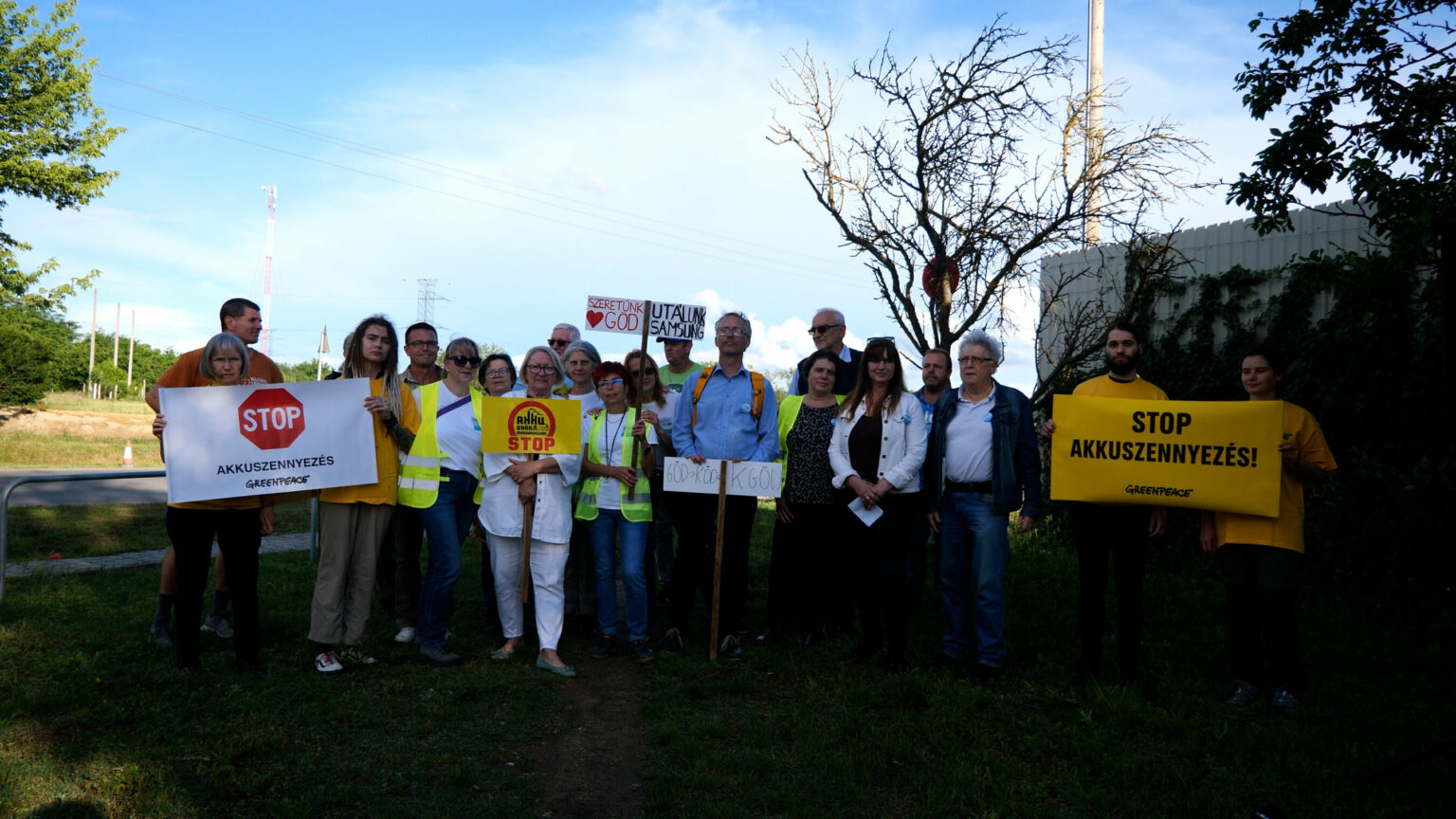The https://english.atlatszo.hu use cookies to track and profile customers such as action tags and pixel tracking on our website to assist our marketing. On our website we use technical, analytical, marketing and preference cookies. These are necessary for our site to work properly and to give us inforamation about how our site is used. See Cookies Policy
Residents and opposition parties held a demonstration at the Göd battery factory
The protest was prompted by a court ruling that ordered the suspension of the factory’s environmental permit – yet to be enforced. Activists from opposition parties blocked multiple entrances to the battery factory after the protest was announced. The government office disputes the need to completely suspend the factory’s operations as per the court decision.
The Göd-ÉRT Association and Greenpeace Hungary held a demonstration on the evening of May 22 next to the Samsung battery factory. The organizers protested the factory’s ongoing operations despite the court order issued a few weeks ago stating the factory must suspend its environmental usage.

Protestors were joined by activists from opposition parties. Göd-ÉRT Association representatives Zsuzsa Bodnár and Andrea Szaszkó accused the Göd megafactory of six years of non-compliance with Hungarian regulations. Hungarian authorities have been unable to enforce Samsung SDI’s compliance with environmental and disaster management regulations.
Szaszkó addressed the crowd, approximately one hundred people strong, and highlighted that Hungarian authorities have failed to protect residents from the factory’s detrimental environmental impact.
“In my eyes, you are the nation. Your children, your families, all of you here. I believe it is the duty of Hungarian authorities to protect us, the nation, and the homeland. And we do not see this being done,” Szaszkó said.
Gergely Simon, a chemical expert from Greenpeace Hungary who spoke at the event, said that Hungarian authorities have failed to adequately combat the violations that wrack the domestic battery industry. Simon noted that, in addition to letting the violations go, authorities also failed to investigate any reports of pollution incidents.
Earlier, it was reported that Greenpeace investigations revealed that wastewater from the Göd sewer system, which spilled onto farmland, contained high concentrations of a teratogenic solvent used in battery production. Greenpeace is protesting against the pollution caused by the battery factory through a petition. They are also demanding a comprehensive strategic environmental assessment of all battery industry investments in Hungary. Finally, they urged the state to halt the establishment of new plants until regulation compliance can be ensured.
Following the protests, activists from opposition parties including Momentum, Dialogue for Hungary (Párbeszéd), and LMP blocked several of the factory’s entrances. Viktória Vajda, a Momentum municipal representative in Göd, told Átlátszó: “Since the authorities are not enforcing the suspension ordered by the court, we are taking action to ensure compliance with the court’s decision. This factory should not operate without a valid environmental usage permit that meets legal requirements.”
The blockade lasted till around 9 p.m.

Activists of the Göd-ÉRT Association and Greenpeace Hungary at the demonstration on 22 May 2024 (Photo: Dénes Balogh/Átlátszó)
The official position: The Factory need not shut down
While the protest played out on Wednesday, the Pest County Government Office, which had not previously responded to the court ruling, also issued a statement. The statement clarified: “The court did not order the factory’s closure, but it restricted certain activities, which the government office is investigating. Contrary to false claims in the media, the court’s decision did not require the factory’s complete shutdown but mandated the restriction of activities that need a unified environmental usage permit. Therefore, the factory can operate its boilers with a total nominal heat output of up to 50 MWth, limiting its operation to this level, and must reduce other activities to levels that do not require a unified environmental usage permit.”
As previously reported, the issuance of the Samsung factory’s environmental usage permit occurred after Samsung Zrt. installed high-capacity heat-producing boilers in the second factory without authorization. This led the authorities to order an environmental review of the factory – they subsequently issued a 10-year environmental usage permit. The use of organic solvents required for battery production also requires a permit—something the government office did not mandate for the factory’s first five years of operation, despite regulations.
The permit specifies that exceeding a capacity of 200 tons per year of organic solvents requires an Integrated Pollution Prevention and Control (IPPC) permit, similar to the requirements for the CATL factory in Debrecen and the battery factories in Komárom and Iváncsa.
According to the permit issued for the Samsung plant, the amount of organic solvent N-Methyl-2-pyrrolidone (NMP) used in the Göd factory was 14,400 tons in 2022, with 11,000 tons already used in 2019. If the government office’s statement to “reduce the extent of other activities to levels permissible without a unified environmental usage permit” is interpreted correctly, it would mean reducing the usage of organic solvents to below 200 tons per year. This raises the question of whether the factory can continue battery production under such restrictions.
It might not be a dilemma the factory will face any time soon – based on the government’s official stance, regulations and repercussions are lax at best.
Translated by Vanda Mayer. The original, Hungarian version of this story was written by Zsuzsa Bodnár and can be found here. Video by Dénes Balogh. The article was produced with the support of the Union Values Programme.

